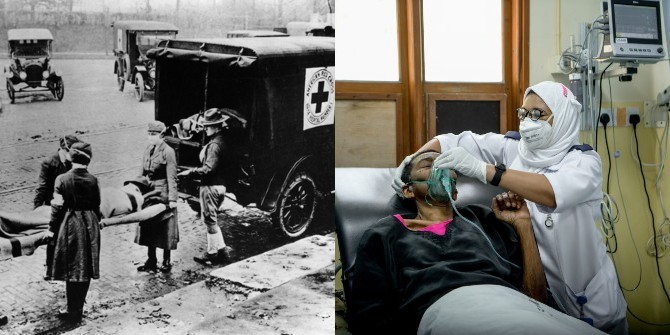Some have warned that EU crisis politics undermines democracy. But European policymaking during the early months of the pandemic reveals a different picture, argue Zbigniew Truchlewski, Waltraud Schelkle and Joe Ganderson (LSE).
Over the past decade, a new literature has emerged that considers how emergency politics might be exploited by European policymakers. It depicts leaders and bureaucrats as engaged in a process of “crisisification”, scanning the horizon for the next emergency in which policy decisions can be pushed through by executive authority. Democratic deliberation is sidelined as supranational actors like the European Commission and the European Central Bank, and powerful states, exploit emergency situations to increase their power.
Together, these accounts portray crises as shocks that call for rapid action, driven by ‘external demands rather than chosen normative priorities‘. Familiar appeals to TINA (‘there is no alternative’) are complemented by calls for urgency and the necessity of strict timetables, imposed from on high. The emergency politics playbook follows a regular script. But as Jonathan White argues, European leaders follow this road at their peril, as emergency politics is shadowed by a new wave of Euroscepticism.
This is clearly a debate of great importance for the future of the EU. Yet despite recent predictions of its demise, the EU has still not met its reckoning. Do EU institutions really benefit from being seen repeatedly as scrambling for solutions when markets panic and human misery spreads across borders? In a recent article, we question these precepts and ponder whether emergency politics might be operating in a more benign manner. COVID-19 is the latest – perhaps greatest – crisis to rock the EU. It allows us to refine the claims of an emergency politics literature that has developed with the Euro area and refugee crises.

From the start, the governments of the most heavily affected member states, Italy and Spain, insisted that the pandemic was a dual crisis. The public health emergency needed rapid responses while the economic recovery further down the line would require new budgetary instruments. This split a single crisis into fast- and slow-burning parts. We show that the fast-burning crisis ratcheted up existing mechanisms, with the Council of member states authorising the Commission to coordinate their efforts and take uncontroversial practical action, such as diverting research funding to medical supplies and suspending state aid rules to facilitate bailouts. The member states, themselves competent on healthcare, were able to determine their own epidemiological strategies. By contrast, the slow-burning macroeconomic crisis required coordinated action and took several months to come to a compromise that surprised most EU observers.
Here, the so-called Frugal Four – Austria, Denmark, Sweden and most vocally, the Netherlands – insisted that existing mechanisms were enough, perhaps topped up by additional cheap short-term loans or small-scale grants. In Italy, the use of the existing European Stability Mechanism with strings attached was anathema. In late March 2020, Prime Minister Giuseppe Conte initiated a letter, signed by nine European leaders including Emmanuel Macron, proposing a common debt instrument. Soon dubbed a ‘Coronabond’, it also raised alarm bells in Berlin. But instead of siding with the Frugal Four, the German government sought to make a constructive counter-proposal, in close cooperation with Macron. The Franco-German alliance picked up the idea of two liberal Members of the European Parliament that was also promoted by the Socialist Finance Minister of Spain. In May, Merkel and Macron presented a recovery fund for all EU members, comprising €500 billion in grants. The Commission would get the right to issue bonds to finance this and taxing powers to repay them. Member states would not guarantee the bonds but the EU budget would act as security for the issuance of debt. To this proposal, the Commission added €250 billion of loans. A modified version was adopted at a marathon summit in late July, providing budget support of up to 6% of EU GDP, primarily for poorer and disproportionately pandemic-hit members.
We do not seek to appraise the EU’s performance: its early failures are well-documented, as much as the mode in which it operated. But did COVID follow the emergency script? If so, we would expect to see patterns in three areas:
(1) a contrived emergency, communicated top-down from EU institutions to member states;
(2) sequencing in which the EU institutions initiate proposals to which democratically elected governments can only respond;
(3) EU-imposed time pressure on those states to implement these policies.
To test this, we compiled a dataset of almost 1,800 policy-related actions at the EU level between March and July 2020, reported in major English-speaking media outlets. Actions comprise everything from vague initial policy ideas, their support or criticism by others, to concrete policymaking steps through to implementation. Our dataset gives us a granular understanding of early European policy responses to the pandemic.
Firefighting tends to be messy and ad hoc
First, regarding the direction of communication, the European Commission was the most targeted actor between March and July. In fact, it was more an agenda aggregator than agenda setter, receiving policy proposals and demands from member states, the European Parliament and the European Council. Splitting our data by issue, we see more balance on questions of health than economics, indicating that the Commission was more likely to bypass potential democratic dissent and scrutiny in this area. However, we suggest that here the EU’s actions were uncontroversial and generally designed to provide temporary relief rather than permanently reconfigure institutions or grab power. Such actions were unsurprising given that the EU was under fire for not acting decisively enough to support Italy and others. On the more contentious question of designing an equitable recovery fund, communication flowed decidedly bottom-up.
Second, on sequencing, we find a clear pattern of policy claims – ideas, positive and negative responses – being expressed by all actors before policy making steps were discussed. These steps were then followed by a new round of views on these impending decisions, creating a “claim-steps-claim” pattern. This suggests that even in the pressure cooker of the pandemic, deliberation and dissent were regular features of EU policymaking.
European actors cannot want to impose policy solutions on others that may ultimately threaten their project
Third, in terms of time compression, we find that policy claims intensify on the eve of important policy steps like recovery fund negotiations. While the intensity ebbs, national representatives keep on interpreting and discussing the decisions leading to new policy debates and modifications. Normative priorities were indeed discussed by national representatives, framed in terms of a contrast between those supporting solidarity among interdependent members and those who favour responsibility that comes with sovereignty. However, opposing blocs were able to broker a compromise, the Recovery and Resilience Facility, that appeared mutually acceptable to national leaders.
Taken together, EU emergency politics in the public health crisis appeared to buy time for representatives of national democracies to bargain over the European recovery. Emergency policymaking need not be contentious or concealing permanent reforms or malign motives: this ascribes too much calculation to European institutions, which lack competencies and are scrambling to face down imminent threats. Moreover, such actions might facilitate bargaining over longer-term institutional reforms, as highlighted by the thorny issue of how to avoid repeating the recriminations of the Euro area crisis.
Politically sensitive behaviour on the part of the Commission and more powerful member states is not hard to explain. Emergency politics is replete with political risk for executives, especially for a technocracy like the European Commission. Firefighting tends to be messy and ad hoc. A pandemic challenges the claim of an elite bureaucracy that it can deliver for all when democratic member states must prioritise national and possibly factional concerns. Haunted by the spectre of Eurosceptic challengers, European actors cannot want to impose policy solutions on others that may ultimately threaten their project. So while we do detect emergency politics operating in the EU, it is not an antithesis to national democracy.
This post represents the views of the authors and not those of the COVID-19 blog, nor LSE.






1 Comments